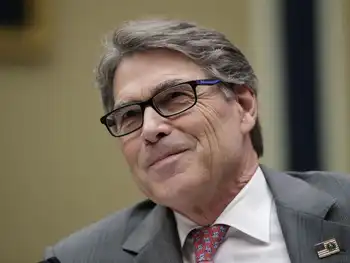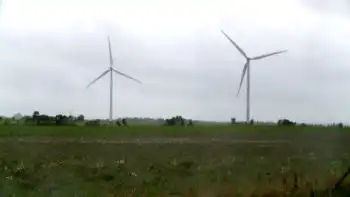QUEBEC CITY, QUEBEC - Under the right conditions, the Quebec government would participate in Ottawa's proposal to develop an east-west power grid that would feed clean power to most of Canada, a provincial official said.
Quebec's approval is key to federal Finance Minister Ralph Goodale's plan for a national hydroelectric grid, which he said would go a long way toward helping Canada meet its targets in reducing greenhouse-gas emissions under the Kyoto accord. It would also ensure the country has a reliable supply of clean power. "The odd thing about this wonderful country is that the power connections tend to run north and south easier than they do east and west," Mr. Goodale said. "And it would be a great environmental advantage if that cleaner power from hydro sources, as opposed to coal sources... could move east and west." Quebec has stated that the transportation of electricity is under provincial jurisdiction and that it would prefer to sign individual trade agreements for exports to neighbouring provinces. But the province said that if Ottawa decides to move on the national power grid, it will participate under certain conditions. "Quebec would need to be compensated for the use of the transmission network it has built, because Hydro-Québec has developed and financed its own network," said Mathieu St-Amant, a spokesperson for the provincial Department of Natural Resources. "And secondly, we want assurances that Quebec will be part of the talks." Manitoba initiated the proposal about two years ago and it was part of Mr. Goodale's environmental package in the recent budget. He committed $5-billion over five years to environmental measures, including a $1-billion Clean Climate Fund that he said could be used for big-ticket projects, such as a coast-to-coast hydroelectric transmission line. Quebec's participation could involve abandoning part of its control over the transportation of energy within its boundaries. That would be a significant shift in provincial policy, since Quebec has closely guarded its jurisdiction over every component of its hydroelectricity development. Ottawa examined the possibility of developing a national power grid in the 1960s and 1970s. The project did not materialize, largely because of Quebec's opposition. With Ontario phasing out its coal-generating stations and with a growing need for a reliable source of clean energy, the issue has resurfaced. A national grid could be a major boost to the Newfoundland-Labrador economy, allowing the province to develop the multibillion-dollar Lower Churchill Falls hydroelectric site and sell the power to Ontario, through Quebec. The Lower Churchill project has been at a standstill, mired in political wrangling and widespread criticism over the benefits Newfoundland and Labrador would receive from signing a deal with Hydro-Québec. Transmission lines carrying electricity from Labrador to the West would need to cross Quebec. Without Quebec's involvement, the Lower Churchill project may never be developed. The proposed national grid, in which Ottawa could negotiate with Quebec the construction and financing of transmission lines through the province, would solve the problem. But Quebec likely would still insist on sharing profits from the Lower Churchill development. The province signed an agreement in the 1960s with Newfoundland for the development of the Churchill Falls hydroelectric project. Quebec has reaped a huge profit from the low energy prices it pays for the electricity under the deal by using the transmission lines on its territory to export the power to U.S. markets. The agreement has been challenged or criticized by every Newfoundland government, with arguments it should be renegotiated. Mr. Goodale said that he will not force Quebec to accept a national grid, but that he hopes to persuade the province with the money set aside for such projects. "There is a lot of negotiations and discussions that needs to be done here. "I think everyone can sense the potential here... [of] the ecological benefits that flow if we can devise an east-west network that would feed most of Canada with clean power."
"The odd thing about this wonderful country is that the power connections tend to run north and south easier than they do east and west," Mr. Goodale said.
"And it would be a great environmental advantage if that cleaner power from hydro sources, as opposed to coal sources... could move east and west."
Quebec has stated that the transportation of electricity is under provincial jurisdiction and that it would prefer to sign individual trade agreements for exports to neighbouring provinces.
But the province said that if Ottawa decides to move on the national power grid, it will participate under certain conditions.
"Quebec would need to be compensated for the use of the transmission network it has built, because Hydro-Québec has developed and financed its own network," said Mathieu St-Amant, a spokesperson for the provincial Department of Natural Resources. "And secondly, we want assurances that Quebec will be part of the talks."
Manitoba initiated the proposal about two years ago and it was part of Mr. Goodale's environmental package in the recent budget.
He committed $5-billion over five years to environmental measures, including a $1-billion Clean Climate Fund that he said could be used for big-ticket projects, such as a coast-to-coast hydroelectric transmission line.
Quebec's participation could involve abandoning part of its control over the transportation of energy within its boundaries. That would be a significant shift in provincial policy, since Quebec has closely guarded its jurisdiction over every component of its hydroelectricity development.
Ottawa examined the possibility of developing a national power grid in the 1960s and 1970s. The project did not materialize, largely because of Quebec's opposition.
With Ontario phasing out its coal-generating stations and with a growing need for a reliable source of clean energy, the issue has resurfaced.
A national grid could be a major boost to the Newfoundland-Labrador economy, allowing the province to develop the multibillion-dollar Lower Churchill Falls hydroelectric site and sell the power to Ontario, through Quebec.
The Lower Churchill project has been at a standstill, mired in political wrangling and widespread criticism over the benefits Newfoundland and Labrador would receive from signing a deal with Hydro-Québec.
Transmission lines carrying electricity from Labrador to the West would need to cross Quebec. Without Quebec's involvement, the Lower Churchill project may never be developed.
The proposed national grid, in which Ottawa could negotiate with Quebec the construction and financing of transmission lines through the province, would solve the problem.
But Quebec likely would still insist on sharing profits from the Lower Churchill development.
The province signed an agreement in the 1960s with Newfoundland for the development of the Churchill Falls hydroelectric project.
Quebec has reaped a huge profit from the low energy prices it pays for the electricity under the deal by using the transmission lines on its territory to export the power to U.S. markets.
The agreement has been challenged or criticized by every Newfoundland government, with arguments it should be renegotiated.
Mr. Goodale said that he will not force Quebec to accept a national grid, but that he hopes to persuade the province with the money set aside for such projects.
"There is a lot of negotiations and discussions that needs to be done here.
"I think everyone can sense the potential here... [of] the ecological benefits that flow if we can devise an east-west network that would feed most of Canada with clean power."
Related News

Coal CEO blasts federal agency's decision on power grid
WASHINGTON - A decision by an independent energy agency to reject the Trump administration’s plan to bolster the coal industry could lead to more closures of coal-fired power plants and the loss of thousands of jobs, a top coal executive said Tuesday.
Robert Murray, CEO of Ohio-based Murray Energy Corp., called the action by the Federal Energy Regulatory Commission “a bureaucratic cop-out” that will raise the cost of electricity and jeopardize the reliability and security of the nation’s electric grid.
“While FERC commissioners sit on their hands and refuse to take the action directed by Energy Secretary Rick Perry and President Donald…




